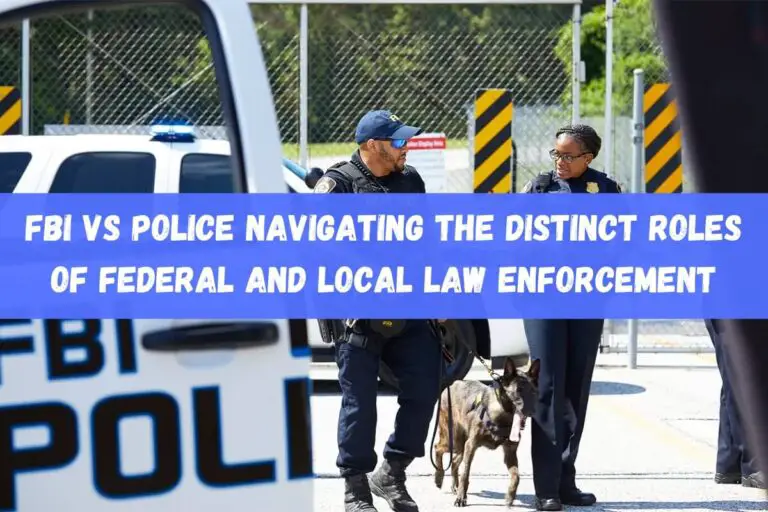Deputy Sheriff vs Police Officer: Key Differences Explained

Maintaining law and order is a critical responsibility that falls on the shoulders of dedicated law enforcement professionals. Among these brave individuals, two prominent roles stand out: deputy sheriffs and police officers. While both share the noble goal of safeguarding our communities, there are distinct differences between these positions that are worth exploring.
Are you contemplating a career in law enforcement but unsure of the nuances between a deputy sheriff and a police officer? The key difference lies in their jurisdictions and the scope of their duties. This guide will explore the details of these crucial roles, explaining their responsibilities, training needs, career paths, and more.
Throughout this article, we will address crucial questions such as:
- What is the primary distinction between a deputy sheriff and a police officer in terms of their jurisdiction?
- How do their day-to-day duties and responsibilities differ?
- What kind of training and education is required for each role?
- What are the potential career prospects and salary ranges for deputy sheriffs and police officers?
By the end of this in-depth exploration, you will have a thorough understanding of the similarities and contrasts between these two essential law enforcement professions, empowering you to make an informed decision about your future career path.
What is a Deputy Sheriff?
A deputy sheriff is a sworn law enforcement officer who works under the authority of an elected county sheriff. Their jurisdiction encompasses an entire county, which may include multiple cities, towns, and unincorporated areas. Deputy sheriffs play a vital role in enforcing local, state, and federal laws within their county’s boundaries.
Unlike police officers who primarily serve within city limits, deputy sheriffs are responsible for a broader geographical area. Their duties often extend beyond traditional law enforcement activities, encompassing a wide range of responsibilities such as:
- Patrolling county roads, highways, and rural areas
- Providing security and maintaining order in courthouses
- Operating and managing county jails and detention facilities
- Serving arrest warrants, civil papers, and court orders
- Assisting in search and rescue operations
- Responding to emergencies and calls for service in rural or unincorporated areas
Deputy sheriffs are appointed by the elected county sheriff, who oversees the entire sheriff’s department. This hierarchical structure allows for potential career advancement opportunities within the department, including the possibility of one day becoming the county sheriff through an election process.
What is a Police Officer?
A police officer, also known as a law enforcement officer, is a sworn public servant responsible for maintaining law and order within a specific city or town. Their jurisdiction is typically confined to the municipal boundaries of the city or town they serve, although their authority may extend to surrounding areas or specific highways and sections of the county.
The primary duties of a police officer revolve around protecting the public and preventing crime within their designated jurisdiction. Some of their key responsibilities include:
- Patrolling city streets, neighborhoods, and residential areas
- Responding to emergency calls and investigating reported crimes
- Enforcing local, state, and federal laws through issuing citations or making arrests
- Directing and controlling traffic, including during accidents or special events
- Participating in community policing initiatives and outreach programs
- Collaborating with other law enforcement agencies on joint operations or investigations
Police officers are hired and employed by municipal police departments, which are typically overseen by a chief of police or commissioner. Their career paths within the department may involve opportunities for specializations, such as becoming a detective, joining specialized units like SWAT or K-9, or pursuing supervisory roles like sergeant or lieutenant.
Jurisdiction: The Primary Distinction
One of the most significant differences between deputy sheriffs and police officers lies in their respective jurisdictions. This distinction in geographical boundaries plays a crucial role in shaping their duties, responsibilities, and overall scope of authority.
Deputy Sheriffs:
- Have county-wide jurisdiction, which encompasses multiple cities, towns, and unincorporated areas within the county
- Can enforce laws and conduct investigations throughout the entire county
- Often responsible for patrolling rural areas, highways, and county roads
- May assist local police departments within the county when necessary
Police Officers:
- Have jurisdiction limited to the city or town they are employed by
- Primarily responsible for enforcing laws and maintaining order within the city/town limits
- May have authority over specific highways or sections of the county that fall within their jurisdiction
- Can collaborate with county sheriff’s deputies or state law enforcement agencies when incidents cross jurisdictional boundaries
Deputy sheriffs and police officers may work together or assist each other in cases like major criminal investigations or large-scale emergencies. Cooperation between law enforcement agencies is essential to ensure public safety and effective law enforcement.
Job Duties and Responsibilities
Although deputy sheriffs and police officers share the common goal of upholding the law and protecting citizens, their specific job duties and responsibilities can vary significantly based on their respective jurisdictions and the nature of their roles.
Deputy Sheriff Duties
As law enforcement officers with a broader geographical jurisdiction, deputy sheriffs often have a wide range of duties that extend beyond traditional police work. Some of their primary responsibilities include:
- Patrolling County Areas: Deputy sheriffs are responsible for patrolling county roads, highways, and rural areas, monitoring for criminal activity, responding to emergencies, and enforcing traffic laws.
- Courthouse Security: Many sheriff’s departments assign deputies to provide security and maintain order in county courthouses, ensuring the safety of judges, court personnel, and attendees.
- Operating County Jails: Deputy sheriffs are often tasked with the operation and management of county jails and detention facilities, overseeing the intake, housing, and transportation of inmates.
- Serving Warrants and Civil Papers: Deputy sheriffs play a crucial role in serving arrest warrants, civil summonses, and other court orders issued within their county.
- Search and Rescue Operations: In rural or remote areas, deputy sheriffs may be called upon to assist in search and rescue operations for missing persons or outdoor emergencies.
- Emergency Response: Deputy sheriffs respond to a wide range of emergencies within their county, including natural disasters, accidents, and criminal incidents.
Police Officer Duties
While police officers share some responsibilities with deputy sheriffs, their duties are primarily focused on maintaining law and order within the confines of their city or town. Common duties of police officers include:
- Patrolling City Streets and Neighborhoods: Police officers patrol assigned areas within their city or town, monitoring for criminal activity, responding to calls for service, and maintaining a visible presence to deter crime.
- Responding to Emergencies: Officers are often the first responders to emergencies within their jurisdiction, such as robberies, assaults, domestic disputes, or medical emergencies.
- Investigating Crimes: Police officers investigate reported crimes, gather evidence, interview witnesses, and apprehend suspects within their city or town.
- Traffic Enforcement: Enforcing traffic laws, issuing citations, and directing traffic during accidents or special events are essential responsibilities for police officers.
- Community Policing and Outreach: Many police departments emphasize community policing initiatives, where officers actively engage with residents, attend community events, and work to build trust and strengthen relationships with the public they serve.
- Collaboration with Other Agencies: In cases that cross jurisdictional boundaries or require specialized resources, police officers may collaborate with county sheriff’s deputies, state law enforcement agencies, or federal agencies to ensure effective law enforcement.
Both deputy sheriffs and police officers may also be called upon to testify in court proceedings, complete extensive paperwork and documentation, and participate in ongoing training and professional development programs throughout their careers.
Training and Education Requirements
Becoming a deputy sheriff or a police officer requires extensive training and education to ensure that these law enforcement professionals are well-prepared to handle the diverse challenges and responsibilities of their roles. While the specific requirements may vary by state, agency, and jurisdiction, there are some common standards and expectations.
Deputy Sheriff Training
To become a deputy sheriff, individuals typically undergo the following training processes:
- Police Academy Training: Aspiring deputy sheriffs must complete a comprehensive police academy training program, which typically lasts several months. These academies provide instruction in various areas, including:
- Firearms handling and safety
- Defensive tactics and use of force
- Emergency vehicle operations
- Report writing and documentation
- Criminal law and procedures
- Patrol techniques and traffic enforcement
- County-Specific Training: In addition to the police academy, deputy sheriff recruits may receive additional training specific to their county’s policies, procedures, and protocols.
- Specialized Training (Optional): Depending on their interests and career goals, deputy sheriffs may have the opportunity to receive specialized training in areas such as:
- K-9 units (handling and working with police dogs)
- SWAT (Special Weapons and Tactics)
- Investigations or detective work
- Courtroom security and prisoner transport
Police Officer Training
Similarly, aspiring police officers undergo rigorous training programs to prepare them for their duties. The training process typically includes:
- Police Academy Training: Police officer candidates must complete a comprehensive police academy training program, which can last several months. These academies cover a wide range of topics, including:
- Firearms training and proficiency
- Self-defense and use of force techniques
- Emergency vehicle operations
- Report writing and documentation
- Criminal law and procedures
- Patrol techniques and traffic enforcement
- City/Department-Specific Training: After graduating from the police academy, new officers may receive additional training specific to the policies, procedures, and protocols of the city or police department they will be working for.
- Specialized Training (Optional): Depending on their interests and career goals, police officers may have the opportunity to receive specialized training in areas such as:
- Criminal investigations and detective work
- Narcotics enforcement
- SWAT (Special Weapons and Tactics)
- K-9 units (handling and working with police dogs)
- Community policing and outreach programs
Education Requirements
A high school diploma or GED is often the minimum educational requirement for deputy sheriffs and police officers, but many law enforcement agencies prefer or require a college degree in a field like criminal justice or law enforcement. Earning a college degree in this field can bring several benefits:
- Improved Job Prospects: Applicants with college degrees may be more competitive in the hiring process and have better chances of being selected for coveted law enforcement positions.
- Accelerated Career Advancement: In some agencies, having a college degree can lead to faster promotion opportunities or higher starting salaries.
- Enhanced Knowledge and Skills: College programs in criminal justice or law enforcement provide a comprehensive understanding of legal concepts, investigative techniques, and communication skills essential for success in these careers.
- Continuing Education Opportunities: Many law enforcement agencies offer tuition assistance or incentives for officers and deputies to pursue further education, such as earning a bachelor’s or master’s degree while employed.
Education requirements vary between agencies and jurisdictions, so research the specific requirements of the law enforcement agencies you’re interested in joining.
Career Prospects and Salary Comparison
Both deputy sheriffs and police officers have the potential for rewarding and diverse career paths within their respective law enforcement agencies. However, the specific opportunities and salary ranges can differ based on factors such as location, agency size, and individual qualifications.
Deputy Sheriff Career Path
As a deputy sheriff, the typical career path often includes:
- Entry-Level Deputy: Most individuals begin their careers as entry-level deputy sheriffs, responsible for patrolling assigned areas, responding to calls for service, and performing various law enforcement duties within the county.
- Promotion Opportunities: With experience and excellent performance, deputy sheriffs may have the opportunity to advance to supervisory roles such as sergeant, lieutenant, or captain. These promotions often involve additional responsibilities, including overseeing teams of deputies and managing operations within the sheriff’s department.
- Specialized Assignments: Depending on the size and resources of the sheriff’s department, deputies may have the chance to join specialized units or divisions, such as investigations, SWAT, K-9, or training units.
- Elected Sheriff: In some jurisdictions, deputy sheriffs with significant experience and qualifications may have the opportunity to run for the elected position of county sheriff, which would place them at the helm of the entire sheriff’s department.
Police Officer Career Path
The career path for police officers typically follows a similar trajectory, with opportunities for advancement and specialization:
- Entry-Level Patrol Officer: Most police officers begin their careers as patrol officers, responsible for patrolling assigned areas, responding to calls for service, and enforcing laws within their city or town.
- Promotion to Supervisory Roles: With experience and demonstrated leadership abilities, police officers may be promoted to supervisory positions such as sergeant or lieutenant, overseeing teams of officers and managing operations within their precinct or division.
- Specialized Units: Depending on the size and resources of the police department, officers may have the opportunity to join specialized units or divisions, such as investigations, narcotics, SWAT, or community policing units.
- Command Staff: In larger police departments, highly experienced and qualified officers may have the chance to advance to command staff positions, such as captain, deputy chief, or chief of police, overseeing the entire department’s operations and setting strategic goals.
Salary Comparison
The salaries for deputy sheriffs and police officers can vary significantly based on factors such as location, cost of living, agency size, and individual qualifications. However, on average, the following salary ranges are typical:
- Deputy Sheriff Salary Range: According to the ZipRecruiter, the median annual salary for deputy sheriffs and sheriff’s patrol officers in the United States is around $61,528. However, salaries can range from around $50,500 for entry-level positions to over $90,000 for experienced or supervisory roles.
- Police Officer Salary Range: The ZipRecruiter reports that the median annual salary for police officers and detectives in the United States is approximately $62,148. Entry-level police officers may start with salaries around $40,000 to $50,000, while experienced officers or those in supervisory roles can earn upwards of $90,000 or more.
Salaries can be influenced by various factors, including:
- Location and Cost of Living: Law enforcement salaries tend to be higher in areas with a higher cost of living, such as major metropolitan areas or coastal regions.
- Agency Size and Budget: Larger law enforcement agencies with bigger budgets may offer higher salaries and better benefits packages compared to smaller agencies.
- Level of Education and Experience: Officers and deputies with advanced degrees, specialized training, or extensive experience may command higher salaries.
- Hazardous Duty Pay and Overtime: Additional compensation may be provided for working in high-risk environments or for overtime hours worked.
Deputy sheriffs and police officers typically receive comprehensive benefits packages, including health insurance, retirement plans, and paid time off, which can enhance their compensation.
Frequently Asked Questions
Can deputy sheriffs and police officers work outside their jurisdictions?
While deputy sheriffs and police officers have defined jurisdictional boundaries, there are circumstances where they may need to operate outside their primary areas of responsibility. These situations can include:
- Mutual Aid Agreements: Many law enforcement agencies have mutual aid agreements in place, which allow officers and deputies to cross jurisdictional lines to assist other agencies during emergencies, major incidents, or large-scale events.
- Task Forces and Joint Operations: In cases involving complex investigations or organized crime, law enforcement agencies may form task forces or joint operations that involve officers and deputies from multiple jurisdictions working together.
- Hot Pursuit: In certain circumstances, officers or deputies may be permitted to pursue a suspect across jurisdictional boundaries if the pursuit begins within their jurisdiction.
- Extradition and Prisoner Transport: Deputy sheriffs or police officers may be tasked with transporting prisoners or extraditing individuals across state or county lines, depending on the specific situation.
Officers and deputies usually don’t have the same authority or enforcement powers outside their primary jurisdictions, even when cooperating across jurisdictions.
What are the physical and psychological requirements?
Both deputy sheriffs and police officers are expected to meet certain physical and psychological standards to ensure they are capable of performing the demanding duties of their roles. These requirements typically include:
- Minimum Age: Most law enforcement agencies require candidates to be at least 21 years of age, although some may have higher age requirements.
- Physical Fitness Standards: Applicants must pass physical fitness tests that evaluate their strength, endurance, and overall physical capability to perform tasks such as pursuing suspects on foot, subduing individuals, or providing emergency assistance.
- Vision and Hearing Requirements: Candidates must have acceptable levels of vision (with or without corrective lenses) and hearing to effectively perform their duties.
- Background Checks: Extensive background checks are conducted to ensure candidates have no disqualifying criminal records, financial issues, or other factors that could compromise their integrity or ability to serve as law enforcement officers.
- Drug Testing: Candidates must pass drug tests to ensure they are free from illegal substance use.
- Psychological Evaluations: Psychological assessments are often required to evaluate a candidate’s mental stability, decision-making abilities, and overall suitability for the high-stress and potentially dangerous nature of law enforcement work.
- Integrity and Ethics Assessments: Agencies may also conduct assessments to evaluate a candidate’s moral character, ethical decision-making abilities, and adherence to the principles of honesty and integrity.
These requirements help ensure that only qualified and capable individuals are selected for these critical law enforcement roles, where the safety of the public and fellow officers is paramount.
Are there job opportunities in federal law enforcement?
Deputy sheriffs and police officers mainly work locally, but federal law enforcement agencies also offer career opportunities. These roles require extra training and qualifications and involve different challenges and responsibilities. Examples include federal agencies:
- Federal Bureau of Investigation (FBI): Agents with the FBI investigate a wide range of federal crimes, including terrorism, cybercrime, organized crime, and white-collar crimes. The application process is highly competitive, and candidates typically need a bachelor’s degree, relevant work experience, and must undergo extensive training at the FBI Academy.
- Drug Enforcement Administration (DEA): DEA agents are responsible for enforcing federal laws related to the production, distribution, and trafficking of illegal drugs. Candidates must have a bachelor’s degree, relevant experience, and complete rigorous training at the DEA Academy.
- United States Marshals Service: U.S. Marshals are responsible for apprehending federal fugitives, protecting federal witnesses, transporting federal prisoners, and ensuring the safety of the federal judiciary. Candidates must meet specific age, education, and experience requirements, as well as complete training at the U.S. Marshals Service Basic Training Program.
- Bureau of Alcohol, Tobacco, Firearms, and Explosives (ATF): ATF agents investigate and enforce federal laws related to firearms, explosives, arson, and alcohol and tobacco trafficking. Candidates typically need a bachelor’s degree, and relevant experience, and must complete training at the Federal Law Enforcement Training Centers.
Federal law enforcement positions have a competitive process but offer unique opportunities for those interested in specialized areas of law enforcement and serving at the national level.
Can prior military experience be beneficial?
Prior military experience can be beneficial for individuals seeking careers as deputy sheriffs or police officers. Many law enforcement agencies actively recruit candidates with military backgrounds, recognizing the valuable skills and training they bring to the table. Some of the potential advantages of military experience include:
- Discipline and Training: Military service instills a strong sense of discipline, attention to detail, and the ability to follow orders and protocols – qualities that are highly valued in law enforcement.
- Physical Fitness: Military personnel are expected to maintain a high level of physical fitness, which can be advantageous in meeting the physical demands of law enforcement work.
- Teamwork and Leadership: The military emphasizes teamwork, communication, and leadership skills, which are essential for effective law enforcement operations and potential advancement opportunities.
- Specialized Skills: Depending on their military occupational specialties, veterans may have experience with firearms, tactical operations, investigations, or other skills directly applicable to law enforcement roles.
- Veteran Preference: Many law enforcement agencies offer veteran preference in their hiring processes, recognizing the sacrifices and valuable experiences of military service members.
- Opportunities for Specialized Roles: Veterans with relevant military experience may be well-suited for specialized law enforcement roles, such as SWAT teams, K-9 units, or tactical response units.
Military experience can be helpful but is not usually required to become a deputy sheriff or police officer. Agencies consider various factors like education, training, and qualifications when hiring. Military background can make a candidate more competitive by showcasing relevant experiences and skills.






